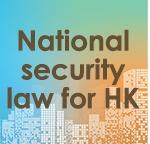Editor's Note: China Daily is publishing a series of stories, interviewing experts from Hong Kong and the mainland, to further explain Hong Kong's new National Security Law.
The newly enacted National Security Law for Hong Kong, which includes a provision on offenses outside the region, has a full legal basis and conforms to international laws, experts said.
They said the provision is based on China's Criminal Law. It also falls under the protective principle-a rule of international law that allows a sovereign state to assert jurisdiction over a person who is not its national if his or her conduct outside the territory threatens its state security.
The Standing Committee of the National People's Congress, China's top legislature, unanimously passed the National Security Law for the special administrative region on June 30.
It introduces four types of crimes that endanger national security-secession, subversion, terrorism and collusion with a foreign country or external elements-and sets life imprisonment as the heaviest penalty.
Among its 66 articles, Article 38 stipulates that this law applies to offenses committed outside the region by nonpermanent residents of Hong Kong, meaning foreign nationals outside of Hong Kong could also face punishment if they commit any of the four types of national security crimes against the HKSAR.
ALSO READ: First person charged under new HK security law denied bail
The provision has triggered discussions, with some critics calling it "long-arm jurisdiction", meaning the ability of local courts to exercise jurisdiction over foreign defendants, and saying the law could go further than Chinese mainland legislation.
... Article 38 is closely linked to Article 8 of China's Criminal Law, which is in line with the international protective principle and based on the particularity of crimes that endanger national security.
Han Dayuan, a professor of law at Renmin University of China, Beijing
Han Dayuan, a professor of law at Renmin University of China in Beijing, said Article 38 is based on China's Criminal Law, of which Article 8 clearly stipulates that foreigners who commit a crime against the State outside the territory and territorial waters and space of China could face punishment accordingly.
Since Hong Kong is not a political entity but a local administrative region of China, the wording of the National Security Law is different from the Criminal Law and uses the phrase "nonpermanent residents "rather than "foreigners", he said.
Han said crimes against national security, unlike general types of crimes, are particular and different, because they are concerned about splitting and subverting an entire country.
Many countries around the world have similar regulations. For example, Section 5 of the German Criminal Code covers acts such as treason committed abroad.
"Therefore, Article 38 is closely linked to Article 8 of China's Criminal Law, which is in line with the international protective principle and based on the particularity of crimes that endanger national security," he added.
READ MORE: HK's national security committee convenes first meeting
Protective jurisdiction
Shi Yan'an, a professor of criminal law at Renmin University of China, said Article 38 means anyone who is not a permanent resident of Hong Kong and commits a crime under the law outside of Hong Kong would be investigated for criminal responsibility, and that also includes residents of the Chinese mainland, Taiwan and the Macao SAR.
Shi said this article is very different from "long-arm jurisdiction".
"The United States believes it has jurisdiction as long as the case has a connection with the country, even if the case does not substantially harm its interests," he said.
In contrast, the National Security Law for Hong Kong follows "protective jurisdiction" and applies to crimes that are indeed closely linked to the HKSAR's interests or may seriously damage China's national security, he said.
READ MORE: New legislation requires HK-Beijing cooperation
Shi said protective jurisdiction is an important approach to safeguarding national interests and many countries have similar regulations, including the Russian Federation and South Korea.
Shi said Article 38 is "without doubt rational" because there are indeed some people who engage in crimes against the HKSAR outside China's territory.
zhangyangfei@chinadaily.com.cn



